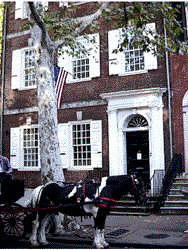Powel House

Powel, one of Philadelphia's wealthiest, met Voltaire, the pope, and the Duke of York. George and Martha were frequent visitors.
Samuel Powel was the last colonial mayor of Philadelphia before the Revolution. He was the first mayor after the Revolution.
Powel was a third-generation Philadelphian. His grandfather, Samuel Powell, an orphan, and his grandfather's aunt came to the colonies in 1685. Through an advantageous marriage and an extraordinary gift for carpentry and bridge-building, the elder Powell became the wealthy owner of dozens of Philadelphia homes and properties. The elder Powell's son, Samuel Powell Jr., was a merchant. He dropped the second "l" in Powell to become Powel. The elder Powel passed on in 1756, having outlived his son by nine years, and so the bulk of the elder's estate skipped a generation and was passed on to the future-mayor when the youngster turned 18.
As the scion of one of Philadelphia's wealthiest families, Samuel Powel did what many of the well-educated, well-to-do did: he traveled Europe. Whereas most stayed on the continent for one or two years, young Powell stayed for seven years. Among those he met on his travels were the Duke of York, the pope and Voltaire, who urged him to hate "priests." Powel did not heed Voltaire, for while in England he converted from Quakerism to the Anglican Church.
Upon returning to Philadelphia, Powel married Elizabeth Willing, the daughter of Charles Willing and Ann Shippen. Young Samuel, no doubt influenced by his European travels, declined to move into one of the 90 houses he now owned and instead purchased the present house on 3rd Street from Charles Stedman. Stedman was the part-owner of a forge and a substantial landowner, who eventually fell upon hard times and wound up in debtors' prison in 1774.
The Powels became known as great entertainers. George and Martha Washington became good friends of Samuel and Elizabeth, often eating at the 3rd Street residence. The Washingtons returned the favor by having the Powels to Mount Vernon a half dozen times.
Powel sided with the Colonies during the Revolution, thus earning himself the sobriquet, "the Patriotic Mayor." He died, among too many others, in the Yellow Fever epidemic of 1793.
- Various parts of the interior were sold by a Wolf Klebansky, owner of the Powel House in 1917, to the Metropolitan Museum of Art in New York City.
- Powel served as pallbearer at Benjamin Franklin's funeral.
- Original owner, Charles Stedman, ended up in debtors' prison.
- Washington ate here.
- House almost demolished for an open-air garage in 1931.
- Location: 244 S. 3rd St., between Spruce and Walnut Streets (Map)
- Built: 1765--6
- Architect: Carpenters' Company Member; interior later by Robert Smith
- Style: Georgian
- Commissioned by: Charles Stedman
- Tourism information: Th-Sa noon-5pm; Su 1pm-5pm. $3 adults; $2 seniors, students, and children. Special tours available. Group rates available. 215-627-0364
- Official website
Thank-you to George Boudreaux, Laurie C. Switzer and Robert E. Randolph from the Powel House for reviewing the information on this page. (September 2000)


